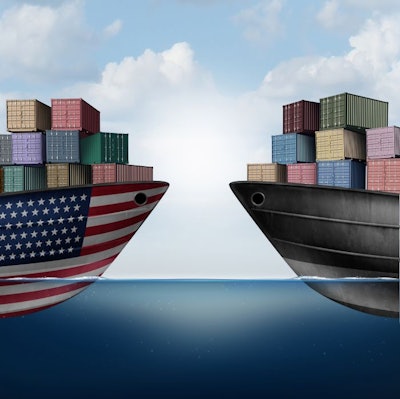
The United States announced Thursday that it would impose tariffs on imported steel and aluminum from Canada, Mexico and the European Union, sparking threats of retaliatory tariffs on many American products, including agricultural commodities.
The tariffs against three of America’s biggest trading partners and allies will be 25 percent on imported steel and 10 percent on imported aluminum. Canada, Mexico and the EU were exempt from previous tariffs on steel and aluminum, but those exemptions were scheduled to end on Friday.
Retaliation threats
Mexico, which said the tariffs are not justified, threatened retaliatory tariffs on U.S. products including pork, fruit and cheese.
The EU threatened tariffs on American orange juice, peanut butter and whiskey, among other items.
“Today is a bad day for world trade,” EU trade commissioner Cecilia Malmström said in a statement. “We did everything to avoid this outcome.”
A British government spokesperson said the U.K. is “deeply disappointed” in the move and that U.S. allies “should be permanently and fully exempted” from the tariffs.
According to reports, U.S. Commerce Secretary Wilbur Ross told EU counterparts at trade talks in Paris that “Europe is using tariffs as an ‘excuse’ to refuse trade negotiations” with China.
“China are paying their tariffs. China hasn’t used that as an excuse not to negotiate. It’s only the EU that is insisting we can’t negotiate if there are tariffs,” Ross reportedly said.
Concern from US ag groups
Ross said retaliatory tariffs from U.S. allies would not have a significant effect on the U.S. economy, but some U.S. agriculture groups disagree.
Farmers for Free Trade said the “announcement opens the floodgates to billions in new tariffs on American agriculture. The list of countries targeting or planning to target American ag exports now includes 28 E.U. members, our closest trading partners in Canada and Mexico, and the world’s largest export markets in China and India. These are markets that the American heartland depends on for economic survival.
“These tariffs will harm U.S. farmers and take many American farm operations to the breaking point. Already, farmers are grappling with the impact of previous tariffs which have caused falling commodity futures, higher equipment prices, and the markets they’ve fought to get into for decades to vanish overnight. The addition of new retaliatory tariffs on everything from bourbon, to rice, to orange juice and cranberries will only widen the pain to additional farmers across the country.”
The U.S. Grains Council says it is disappointed in the move by the White House.
“Based on information we have heard from our customers and past experience, we have every reason to believe U.S. agriculture, including the products we represent, will be among the first hit by counter measures from our trading partners.
“These countries are among our closest neighbors and friends. We have spent years building markets in these countries based on a mutual belief that increasing trade benefits all parties.
“We had strong hopes this situation would be averted permanently, but it now appears we need to prepare for retaliation and its direct impact U.S. farmers. Our global staff is doing this to the best of their abilities as we continue to follow new developments.”
This week, the National Pork Producers Council called for a swift resolution of the United States-China trade dispute, paving the way for increased U.S. pork exports to the world’s largest pork-consuming nation. According to Iowa State University Economist Dermot Hayes, U.S. pork producers have lost $2.2 billion on an annualized basis due to events leading up to and following China’s 25 percent punitive tariffs in retaliation for U.S. tariffs on aluminum and steel.
“Since March 1, when speculation about Chinese retaliation against U.S. pork began, hog futures have dropped by $18 per animal, translating to a $2.2 billion loss on an annualized basis,” Hayes said. “While not all of this lost value can be attributed to trade friction with China, it is certainly the main factor.”
The American Soybean Association (ASA) reiterated its significant concern with the Trump administration’s decision on steel and aluminum tariffs.
The looming threat of tariffs creates uncertainty in the marketplace and for soy growers, whose livelihoods rely on the ability to export their crops and products to China, ASA said in a statement.
“This is real money to a soybean farmer trying to determine when to sell their crop,” said ASA President and Iowa farmer John Heisdorffer. “Farm income is projected to be the lowest in more than five years and farmers cannot afford to have the bottom fall out now.”

















